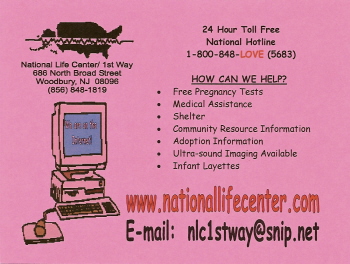 The following op-ed piece first appeared in the Baltimore Sun, 22 Jan. 2007. Copyright © 2007 by Mary Meehan. Peaceful Alternatives Mary Meehan Here we are again at the anniversary of the Supreme Court's 1973 Roe v. Wade decision on abortion. While the March for Life legions rally in the cold to protest that decision, NARAL Pro-Choice America and other groups celebrate the "woman's right to choose." Catherine Callaghan, co-founder of Feminists for Life of America, taught linguistics at Ohio State University. She once remarked: "Choose is a transitive verb; it requires an object. Finish the sentence--choose what?" Ah, but the main point of saying "right to choose" and "pro-choice" and "the choice issue" is to avoid the word abortion. Saying the word calls to mind a violent reality: the death of small human beings who have no way to defend themselves. That is what happens in clinics that offer abortions "up to 24 weeks" and proclaim "most major credit cards accepted" and "student/Medicaid discount." It's the taking of human life in a methodical, routine way. That reality led Ms. Callaghan to join Pat Goltz in starting Feminists for Life in 1972. Members of the Virginia-based group insist that women's rights do not include a right to destroy other human beings. Current president Serrin M. Foster challenges people "on both sides of the abortion debate to come together and address the root causes that drive women to abortion." Her group has a college outreach program that encourages a child-friendly and parent-friendly climate on campus. This can include anything from diaper-changing stations in campus restrooms to maternity coverage in student insurance and child care on campus. Feminists for Life also promotes legislation for federal grants to encourage such services, so that pregnant students will not feel compelled to choose abortion.  "Compelled to choose" is, of course, a contradiction. One who is compelled does not freely choose abortion or anything else. Yet boyfriends, husbands or parents pressure many women to have abortions they do not want. Some men issue ultimatums: "Have an abortion, or this relationship is over." Others are less direct, but use subtle pressures for abortion so they can escape responsibility for their children. Still other men do not discuss the matter, but just walk away. They abandon women entirely, leaving them alone to cope with the financial and other costs of unexpected pregnancy. Some parents, worried about the effects that early childbearing might have on single daughters' education or careers, threaten to expel their daughters from their homes unless they have abortions. In fact, most young women can handle both childbearing and education or a career. For those who cannot, the ancient and honorable practice of adoption offers a peaceful way out. But worries about a daughter's future are not always uppermost in the minds of parents. Some are mainly concerned about what the neighbors will think. Despite the sexual revolution and our presumed sophistication today, the Scarlet Letter tradition dies very hard. Millions of Americans support the "right to choose" abortion, but have a different attitude toward other forms of violence. In speaking of war and the death penalty, for example, they advocate nonviolent alternatives. I believe they are right about those issues--and may they go from strength to strength. But they should also champion peaceful alternatives to abortion: adoption and the practical support offered by pregnancy care centers around the country.  Groups such as Birthright USA, Care Net, Heartbeat International, and the National Life Center sponsor the care centers. The centers offer free counseling, help teenagers talk with their parents, and often provide free maternity and baby clothes, baby formula and furniture. Many arrange free housing for women who are thrown out of their homes by parents or boyfriends. The Nurturing Network can even relocate a woman to another part of the country--and another employer or college--when privacy is a major concern. The first and best pregnancy care center, though, should always be the child's father and the couple's family and friends. When they avoid panic or worry about the neighbors, when they respond in a positive and can-do way, they become a Rock of Gibraltar in time of need. |